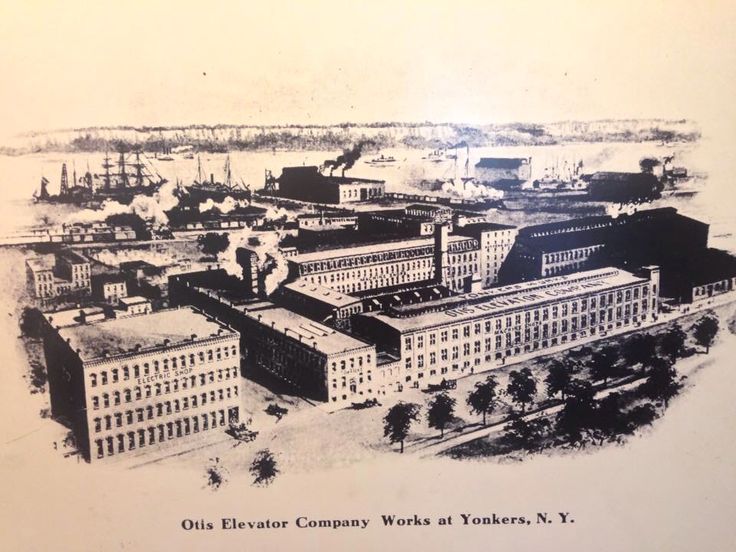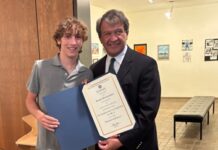
Vintage photo of Otis Elevator Plant in Yonkers, still in existence today
By Mary Hoar, City of Yonkers Historian, President Emeritus Yonkers Historical Society, recipient of the 2004 Key to History, Yonkers Landmarks Preservation Board Member, Revolutionary Yonkers 250 Chair and President Untermyer Performing Arts Council
Monday, January 6th
January 6, 1880: Western Union opened Yonkers’ first telephone exchange.
January 6, 1944: Dr. Lawrence Ashley, Director of Vocational Training for War Industries in Yonkers, announced fifty-four WWII Veterans received jobs through the US Employment Service after completing an intensive two-month training in the Yonkers School of Aeronautical Manufacturing. All 54 men either were discharged for disability, or aged out of the service, being more than 38 years old. In addition to regular students, the Defense School trained 100 returning veterans and placed them in jobs.
School Staff were flexible, creating new training as changes occurred. This new coursework was designed to meet the needs of returning servicemen, to place them immediately in available jobs.
Tuesday, January 7th:
January 7, 1933: Twenty-five-year-old Wolfe Street resident Hemsley Winfield performed the role of the witch doctor in the premiere of the new American opera, “Emperor Jones.” Based on Eugene O’Neill’s play of about an African American conman, the lead role was played by Lawrence Tibbett in black makeup.
Although the Met wanted to stage the production with all white dancers, Tibbett threatened to quit the production unless Winfield and members of Winfield’s New Negro Art Theater filled the dance roles. Because of Tibbett’s stand, Winfield was the first African American under contract to the Metropolitan Opera.
January 7, 1959: City Clerk William Gray issued Yonkers first Bingo license to the Monastery Church of the Sacred Heart, making Sacred Heart the first organization to legally conduct bingo games in Yonkers. The church paid $70, or $10 per night, to run weekly games for two months at 110 Shonnard Place. Our law limited the number of games an organization could run to six per month.
Before applying for a license, sponsoring organizations had to get an identification number from Yonkers Lottery Commission, who also approve the game location. St. Peter’s Church and the Monastery Post, Catholic War Veterans, had identification numbers. The Post planned to hold its games in the former School Ten on Clinton Street.
Wednesday, January 8th
January 8, 1933: Eluding a police cordon spread through the heart of the business section of Getty Square, a daring thief escaped after attempting to steal a pile of bills from a teller’s cage at the Westchester Trust Company.
January 8, 1935: The Yonkers Board of Education purchased insurance for Yonkers schools from 37 local agencies.
January 8, 1954: G. B. Caldwell, Yonkers manager of the New York Telephone Company, announced the people of Yonkers averaged 128,400 phone calls a day, representing three calls a day from every one of the 44,500 Yonkers phones.
Thursday, January 9th
January 9, 1945: Responding to reports of an animal floating down the Hudson on an ice floe, Yonkers Police notified the Yonkers Coast Guard, who sprang into action and picked up a dog from the floe! A few hours later, a second report of an animal floating down the Hudson on ice was called into the Police Department! Our Coast Guard cutter headed towards the animal, a deer, but had difficulty getting the animal on board. Instead, the deer thought the shore was close enough, so jumped off the ice and swam to shore. When last seen, it was galloping through nearby woods.
January 9, 1945: Because of many complaints about the lack of trash collection, Vice Mayor James Sullivan suggested DPW begin a six-day-a-week pickup schedule until May, with the hope trash sitting outside for days would be picked up. In some areas of Yonkers, trash hadn’t been collected for 12 days.
Friday, January 10th
January 10, 1923: At the request of Ludlow residents, the Common Council unanimously adopted Alderman O’Mara’s resolution suggesting the Yonkers Board of Education name the new junior high school being built at Culver Street and Hawthorne Avenue after James B. Ludlow, the one-time owner of most of Southwest Yonkers.
The school was named after Nathanial Hawthorne.
January 10, 1926: Public Safety Commissioner William H. Van Keuren announced he would establish an annual “Medal of Honor” award, as well as other honors for police bravery. He planned this new recognition would give added weight to the Civil Service promotion lists.
January 10, 1937: Four major dairy companies began daylight delivery of milk to their 41,000 Yonkers customers.
Saturday, January 11th
January 11. 1927: Chief of Police Edward Quirk announced news dealers persisting selling “so-called art literature” banned in Yonkers would lose their newsstand privileges.
January 11, 1933: Otis Elevator announced it had won a $270,000 contract to install 17 freight and passenger signal control elevators, the most modern skyscraper elevators, in the Cleveland Post Office.
Sunday, January 12th
January 12, 1930: The State Commission for the Blind asked permission to establish a tobacco stand in City Hall; they planned to have Spencer Traub of McLean Avenue in charge.
January 12, 1947: Mrs. George Blackwell was installed as the first woman president of the Nepperhan Community Center, at the time an agency of the Yonkers Community Chest. She succeeded community activist and Center co-founder Ivan McRae Sr., who served as its president from the time it opened.
January 12, 1954: Former OSS agent Dr. Arie Bestebreurtje discussed “Miraculous Escapes of a Secret Agent” at the first joint meeting of the Asbury Men’s Club and the Woman’s Society of Christian Service of the Asbury Methodist Church in Crestwood. Bestebreurtje escaped from the Nazis in 1941 and went to Great Britain to join the Netherlands army-in-exile. He was wounded twice while on missions behind enemy lines and was decorated by four nations for his exploits.
Questions or comments on this column? Email YonkersHistory1646@gmail.com.
For information on the Yonkers Historical Society, Sherwood House and upcoming events, please visit our website www.yonkershistoricalsociety.org, call 914-961-8940 or email info@yonkershistoricalsociety.org.





